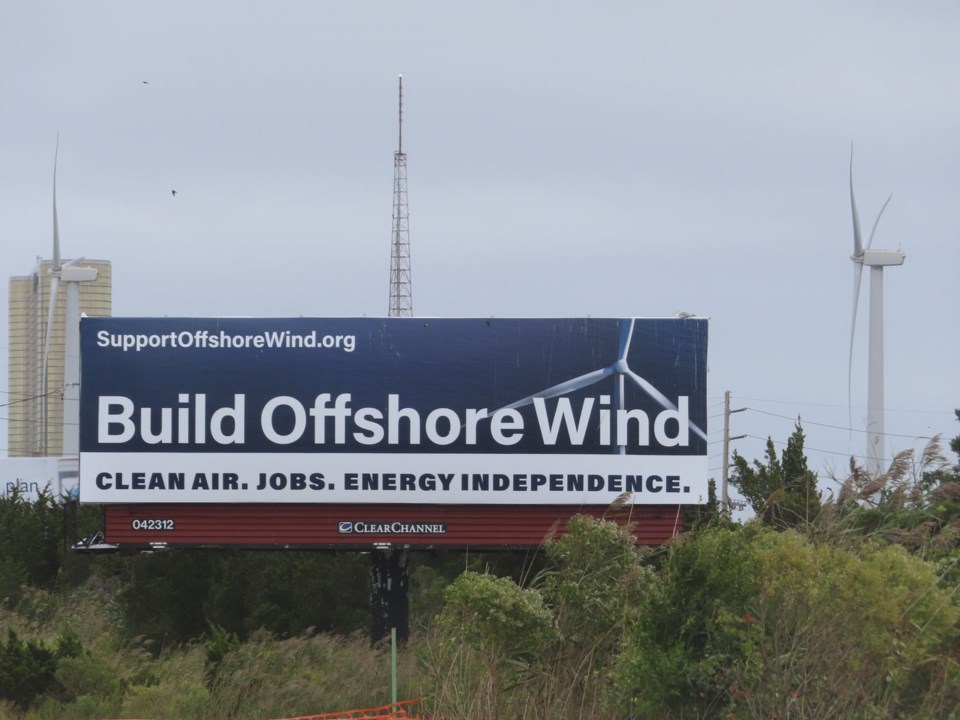ATLANTIC CITY, N.J. (AP) — The U.S offshore wind energy industry says it needs to fight back against disinformation being spread by opponents of wind farms.
During the first day of a national offshore wind conference Tuesday in New Jersey, which has become ground zero for vocal, well-organized opposition to such projects, numerous industry officials said they are in a difficult battle against deliberate falsehoods.
These include thus far unsubstantiated claims that offshore wind preparation is killing whales along the East Coast.
“We know it wasn't us, and we have the research to back it up,” said Crystal Pruitt, an external affairs official with Atlantic Shores, which plans two offshore wind farms off the New Jersey coast. “But the hardest thing to do is prove a negative.”
She said the industry needs to publicly push back against disinformation.
“If you're telling me that the hum from turbines 10 to 12 miles off the beach is going to cause me to go insane, that is not real, and someone needs to say that,” Pruitt said.
Paulina O’Connor, executive director of the New Jersey Offshore Wind Alliance, said she and others in the industry have met with opponents to give them facts about the industry.
“I don't think we're getting through to them,” she said. “I don't feel like we're having that breakthrough. It’s hard to predict what crazy thing they’re going to come up with.”
Last year, amid a spate of whale deaths along the East Coast, offshore wind opponents began linking them to survey work to prepare the ocean floor for wind turbines
But numerous federal and local agencies say there is tying offshore wind to the deaths of the whales, many of which showed signs of having been struck by ships.
Alicia Gene Artessa, director of the New York Offshore Wind Alliance, likened trying to counter disinformation about offshore wind to playing a game of whack-a-mole.
“Every time you feel you have some local opposition under control, they come up with a new topic and start pumping money into that," she said.
One of the most vocal opposition groups, Protect Our Coast NJ, whose members held up anti-offshore wind signs as they picketed outside the hall where Tuesday's conference was held, said the industry is the party peddling untruths.
“We are appalled by the gaslighting of our movement without evidence by shills for the climate industry who hope to cash in if offshore wind becomes a reality,” said Robin Shaffer, the group's president. “This is a case of accusing our group of the very thing that they themselves are doing, muddying the waters, dispensing disinformation to the unwitting public."
The stakes are high for an industry making uneven progress toward goals of having at least 20% of the nation's electricity come from offshore wind by 2035.
The American Clean Power Association says there is almost 65 gigawatts of offshore wind capacity under development in the U.S., enough to power over 26 million homes.
But several high-profile projects have been scrapped, including two in New Jersey that Danish wind giant Orsted a year ago. And a turbine blade failure at the Vineyard Wind project off Martha's Vineyard this summer has only reinforced a belief among opponents that offshore wind is unstable and uneconomical.
Jerry Leeman, CEO of the New England Fishermen’s Stewardship Association, decried the announcement Tuesday that the U.S. Bureau of Ocean Energy Management chosen two developers to build offshore wind on four lease sites in the Gulf of Maine, calling it “a rushed regulatory process” that failed to take into account the turbine failure at Vineyard Wind.
“Vineyard Wind is a slow-rolling disaster," he said. “It is now obvious that foreign mega-developers and their political allies cut corners to bring their flagship project online.”
J. Timmons Roberts, a Brown University researcher who has studied offshore wind opposition groups, said the dynamic has shifted from denying climate change to trying to discredit solutions to it.
“When I saw the rise of these groups in Rhode Island, I was very upset,” he said. “All the arguments I'm seeing are sensationalized or just outright false,” including claims that wind farms would actually cause carbon dioxide levels to increase. He added the industry has to do much better making its case on social media.
___
Follow Wayne Parry on X at www.twitter.com/WayneParryAC
Wayne Parry, The Associated Press




